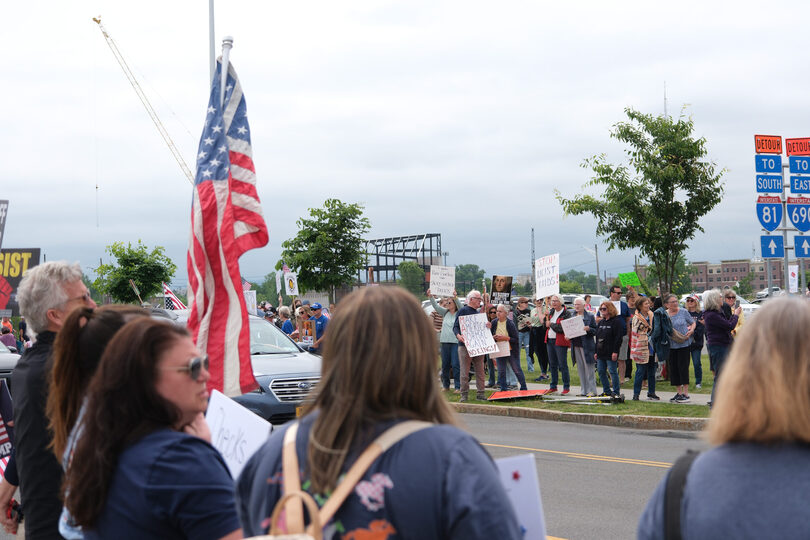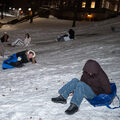SU students navigate fear, uncertainty as ICE crackdowns escalate nationwide

Many SU students say they are feeling firsthand effects of President Trump's immigration crackdown. Some fear leaving home without their passports while others depict their communities as "stripped of life" amid ICE raids. Maxine Brackbill | The Daily Orange
Get the latest Syracuse news delivered right to your inbox.
Subscribe to our newsletter here.
A neighborhood outside Washington D.C., home to Syracuse University student Diana Bonilla-Prado, is one she said usually bustles with street vendors, families and a strong sense of culture.
Now, its streets are empty and seem to be stripped of its community, she said, as the primarily immigrant population stays inside to hide from country-wide Immigration and Customs Enforcement raids.
Several SU students across the country said they’ve felt community-wide shifts after President Donald Trump called for an escalation in national deportation efforts, increasing ICE’s presence in many neighborhoods.
“I feel really scared to go out onto the streets and stand up for my people, because I don’t want someone to follow me back home and then come interview everyone in my family,” said Bonilla-Prado, a sophomore.
In response to Trump’s promises to deport over 10 million migrants, activists have spread curfew-inducing protests originating in Los Angeles, California, throughout the rest of the country.
Along with protesting in their own communities, multiple SU student organizations, including the South American and Latine Student Association, Filipino Student Association and Mexican Student Association, released statements on social media supporting immigrant communities and protesters.
Bonilla-Prado, co-vice president for Latinx Undergraduates Creating History in America, said she had conversations with other executive board members about how to best support their communities.
La L.U.C.H.A. said in its statement that communities must continue to respond to ICE raids with “strength, solidarity and love,” emphasizing that deportation efforts are personal and not just a “policy issue.” The statement encouraged immigrant communities to check in on one another while standing together.
“At the end of the day … the most important thing is to show that even throughout tough times, we are still united,” Bonilla-Prado said. “Even if we’re not on campus, even if it’s through a screen or just an Instagram post, just showing support, I feel we all believe that it’ll show a good message to the rest of our community.”
FSA vice president and senior Lia Kruaprasert echoed Bonilla-Prado, who said there’s an even stronger responsibility to help provide a safe place for students on a visa. FSA also condemned the raids in a statement, urging protesters to stay safe.
The majority of FSA, including Kruaprasert, are from the LA area and felt more motivated to speak out against the ICE raids, she said.
Although she didn’t personally protest, Kruaprasert said she felt the aftermath of demonstrations that turned violent following clashes with the California National Guard and local law enforcement, damaging local businesses and neighborhoods.
Kruaprasert said the cultural hubs in her usually very vibrant city, including Little Tokyo, now seem to be “ghost towns.” The neighborhood was hard to walk through, she said, after seeing the graffiti, broken storefronts and barricaded windows.
“They are families who have built a life here, and every single restaurant said ‘We’re closed indefinitely,’ and had signs on the windows begging them to not graffiti the place, because obviously they’re just normal people who are trying to build a living,” Kruaprasert said. “It was really hard to watch.”
She said the protests, often targeted by ICE agents, have lost many non-white participants for fear of deportation.
Even if we're not on campus, even if it's through a screen or just an Instagram post, just showing support, I feel we all believe that it'll show a good message to the rest of our community.Diana Bonilla-Prado, co-vice president for La L.U.C.H.A.
A member of MEXSA who asked to remain anonymous due to concerns regarding ICE said she has always been a “headstrong activist.” She remembers being told to keep her head down by her family and keep her opinionated writing to a minimum, she said.
As a green-card holder who has lived in the United States for 19 years, she said she knew her rights and felt protected. But when returning from a semester abroad last winter, she was stopped at the U.S. border by the FBI, where she was held and questioned for over two hours about writing she had previously published.
FBI agents said the content of her pieces “pushed back” against Trump’s administration.
“After that point, I did really put my head down,” she said. “I already knew that this was the administration that I was going to be coming into … just because of the way that history was kind of resembling the past. History repeats itself.”
Compared to Trump’s first term in 2017, ICE is arresting 500% more migrants based on noncriminal charges and has increased its street arrests by nearly 500% per week, according to the Cato Institute.
Kyla Cordero, a junior member of FSA, now fears leaving her home in LA without her passport in her pocket. She’s been forced to have difficult conversations with family regarding the possibility of wrongful detainment.
“These events have devastated the community and notably incited terror among many,” Cordero said in a statement to The Daily Orange. “To let this go on without fighting it would be to succumb to the destruction of LA’s beauty, which is why I have immense respect for those attending the protests due to their bravery and heart.”
Bonilla-Prado, who has attended a few protests in D.C., said the demonstrations have brought her and other communities hope, demonstrating solidarity and unity among immigrants throughout the country.
But she said she fears the repercussions of her attendance.
“When you’re living so close to D.C. and you’re seeing all these signs, people protesting, you see a white van and they don’t have any plates,” Bonilla-Prado said. “My community (is) … a community full of immigrants, and everyone is just in full panic mode.”
She, along with Kruaprasert, Cordero and Bonilla-Prado, said one of their biggest fears is their family or friends being detained by ICE agents, and potentially deported.
“These are honest people making a living,” the anonymous MEXSA student said. “They’re not animals for prey.”
As of June 20, 2025, over 55,700 migrants are currently being held in ICE detention, NBC News reported. Almost half of which are listed as “other immigration violators.”
Though the thousands of protests began picking up momentum in May, they’ve shown no signs of slowing down. Marches in LA and the rest of the U.S. have continued to gain national and international attention.
“People come here because they want to live the American Dream,” Bonilla-Prado said. “They come from different countries because they want to make a better opportunity for themselves, for their families … they’ve been paying taxes, doing everything they need to do, and then they just get treated as if they weren’t American.”






